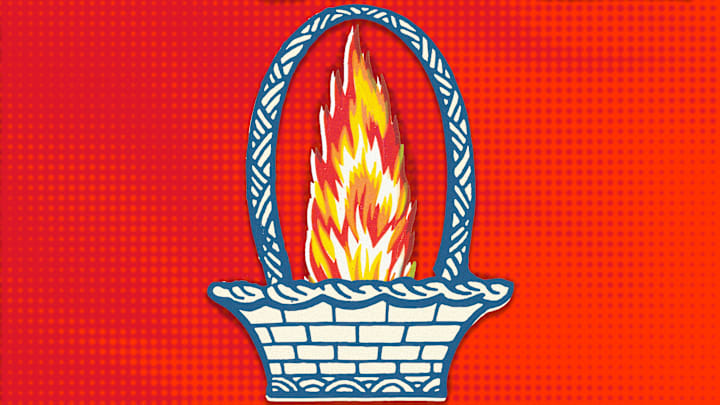When someone says “It’s all gone to Hell in a handbasket,” what they mean is that everything is utterly and irredeemably ruined. But why Hell? And why a handbasket, of all things?
- The French Revolution Origin Myth
- Wheelbarrows and Beyond
- The Many Methods of Going to Hell
- Why Handbasket Reigns Supreme
The French Revolution Origin Myth
Going to hell is a self-explanatory metaphor for total ruination or damnation, but the addition of a handbasket is far trickier to account for. As Phrase Finder explains, in the absence of an obvious explanation, a bizarre myth has emerged claiming that this phrase must allude to the wicker baskets used to catch the decapitated heads of those who fell afoul of the guillotine in Revolutionary France—the hapless victim’s soul being damned to Hell in the process.

As colorful as that idea is, though, it does have some major problems: the guillotine was not invented until 1792, the French Revolution did not begin until the late 1780s, and versions of this expression have been in use since the 1600s at least.
Back then, however, things weren’t always going to hell, and not always in a handbasket.
Wheelbarrows and Beyond
The following excerpt from a 1618 sermon by the English clergyman Thomas Adams contains one of the earliest incarnations of going to hell in a handbasket—albeit somewhat obliquely, and in the form of going to heaven in a wheelbarrow:
“Perhaps you [a rich man who gives little to the church] think to make amends for all, for you will increase the stipend of the vicar … or bestow a little whiting on the church, and a wainscot seat for his own worship. Yea, more; he may chance to found a little alms-house, and give twelve pence a-piece a-week to six poor people. Oh, this oppressor must needs go to heaven! What shall hinder him? But it will be, as the byword is, in a wheelbarrow: the fiends, and not the angels, will take hold on him.”
Adams’s reference to Heaven here is ironic, and as such is rhetorically upturned in the next sentence, when he talks of “fiends” taking hold of the damned rich man, and taking him away “in a wheelbarrow”—an allusion to the common religious image of demonic creatures quite literally carting people off to Hell.
The Many Methods of Going to Hell
According to WordOrigins.org, in the 17th and 18th centuries, all manner of modes of transportation began to appear in stock phrases relating to conveying someone to Hell. They included:
- a horse-litter (“so long as wee will suffer ye to goe to Hell in a Horse litter,” 1636)
- a chariot (“that so his soule might be forthwith carried to hell in a fiery Chariot,” 1641)
- a wagon (“And if you ride to Hell in a Wayn,” 1659)
- a cradle (“he was going to Hell in a Cradle, for so he term’d the Rolling of the Vessel,” 1734)
The earliest reference Word Origins found to a handbasket dates from a 1682 piece written by Henry Care:
“That noise of a Popish Plot was nothing in the world but an intrigue of the Whigs to destroy the Kings best Friends, and the Devil fetch me to Hell in a Hand basket, if I might have my will, there should not be one Fanatical Dog left alive in the three Kingdoms.”
Long story short: At its root, going to hell in a handbasket alludes to a familiar religious image of damnation—and there were multiple (and increasingly imaginative) versions used in the 17th and 18th centuries, both in church and outside of it.
Why Handbasket Reigns Supreme
But why is it only the handbasket version that appears to have caught on?
The fact that you might sometimes also hear this expression as hell in a handcart might provide us with a clue: The snappy alliteration of Hell and handbasket likely made this version a bit more memorable than the other iterations. As a result, things have been going to hell in handbaskets rather than anything else ever since.
Discover the Answers to More Big Questions:
